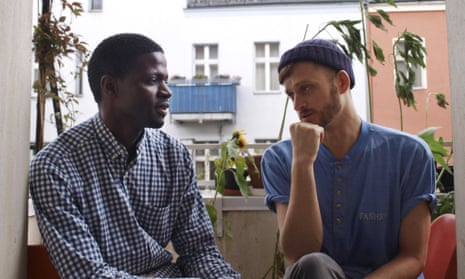A German group which matchmakes citizens willing to share their homes with refugees said it had been overwhelmed by offers of support, with plans in the works for similar schemes in other European countries.
The Berlin-based Refugees Welcome, which has been described as an “Airbnb for refugees”, has helped people fleeing from Afghanistan, Burkina Faso, Mali, Nigeria, Pakistan, Somalia and Syria.
More than 780 Germans have signed up to the Refugees Welcome website and 26 people have been placed in private homes so far. Two of the site’s founders, Jonas Kakoschke, 31, and Mareike Geiling, 28, live with 39-year-old Bakari, a refugee from Mali, whom they are helping with German classes while he waits for a work permit.
A spokesman said the project’s growing success has now led to offers of help to set up similar schemes in other EU countries, including Greece, Portugal and the UK, with a comparable project in Austria already up and running since January.
Over the weekend, thousands of Icelanders offered to accommodate Syrian refugees in their own homes in an open letter to the government about the migration crisis.
Among those who have responded to the German site have been PR consultants, carpenters and many students, spanning a large age range from 21 to 65. Most are people living in flatshares, the group said, but offers have also come from married couples and single mothers.
Teacher Johann Schmidt shares his apartment in Konstanz with an Iraqi refugee, with whom he was matched after registering with the site in November 2014. “Azad tells me about his home country time and again, and can explain the overall context of the current situation to me in simple terms,” Schmidt said. “I’ve learned quite a bit from him already and very much enjoy listening to his stories.”
Accommodating a refugee does not have to mean losing out on the rent of a room, Refugees Welcome said. In a third of the cases, costs are covered either by the job centre or social welfare payments, and a quarter of the rents are paid for via micro-donations to the site.
“We are overwhelmed by people’s readiness to help,” the group said on Tuesday. “We are now receiving inquiries from different countries within Europe such as Greece, Portugal and Scotland, but also from Australia and the US.
“Everywhere, people are keen to realise this idea in their countries to be able to offer refugees a home.”
Others have been taking refugees into their homes on their own initiative, even politicians. Martin Patzelt, an MP from chancellor Angela Merkel’s CDU party, temporarily housed two Eritrean refugees in his home in Brandenburg.
Patzelt said he been contacted by many other Germans offering their homes too, but had also received death threats. “I didn’t want any refugees in my life, but they came. And I took the challenge,” he told EU Observer.
Offers of help have sometimes been too numerous for authorities to handle. On Tuesday, Munich police appealed to the public to stop bringing gifts for refugees, announcing in a tweet that they had been overwhelmed by the amount of provisions people had left, including foodstuffs and nappies.

Comments (…)
Sign in or create your Guardian account to join the discussion